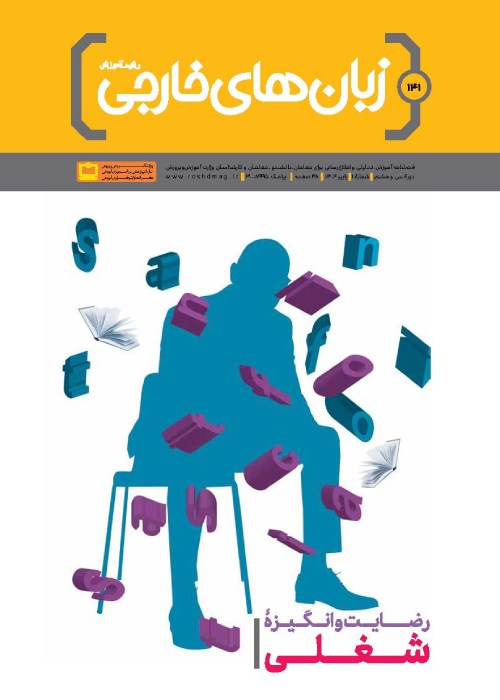فهرست مطالب
نشریه رشد آموزش زبان های خارجی
پیاپی 131 (پاییز 1399)
- تاریخ انتشار: 1399/07/19
- تعداد عناوین: 13
- سخن سردبیر
- یادگیری دیجیتال
-
صفحه 4
- مطالعات میان رشته ای
-
Page 1
Recently, mentoring and its constructive effects on teachers, novice ones in particular, have become the focus of extensive studies on language teaching. This is undoubtedly due to the significance of mentoring in improving the quality of teachers’ performance. Therefore, the present study is aimed at performing an investigative review on some major works in this area in order to examine the role of mentors in formation and development of student teachers’ identity as teachers and in shaping their attitudes towards their profession. It becomes clear that depending on the type of mentoring roles, they may have both positive and negative effects on identity formation of student teachers. The study finishes with some possible research questions for further research.
Keywords: mentoring, student teacher identity, mentoring roles -
Page 9
Vocabulary learning strategies are the strategies learners utilize to acquire new words, and vocabulary size refers to the number of word families one knows. The current study was designed to examine the probable relationship between Iranian EFL learners’ vocabulary learning strategies and their vocabulary size. To this end, at first 80 advanced language learners were asked to answer a questionnaire identifying their vocabulary learning strategies. It consisted of 25 items on different vocabulary learning strategies including, social, cognitive, metacognitive, and memory strategies. The same learners were then presented with vocabulary size test which revealed their vocabulary size scores. Correlation and regression analysis on the obtained data revealed that there is a positive correlation between learners’ vocabulary learning strategies and their vocabulary size. Moreover, regression analysis revealed that vocabulary learning strategies are a good predictor of vocabulary size since 42 percent of learners’ vocabulary learning strategies could potentially predict learners’ vocabulary size. Moreover, identifying the most common vocabulary learning strategies adopted by Iranian EFL learners provides both learners and teachers with a better view on vocabulary acquisition.
Keywords: vocabulary learning strategies, vocabulary size, vocabulary acquisition -
Page 16
One of the most important factors in renovation in foreign language teaching classrooms is teacher’s innovation. The question is whether this innovation can introduce professional پdevelopment or happens as a result of training for professional development. To answer these questions, it is necessary to conceptualize and define the two terms. This paper intends to evaluate these two important features of language teachers and at the end, to propose suggestions for the development and promotion of these two interrelated concepts.
Keywords: innovation, professional development, interacti -
Page 22
Undoubtedly, the close integration of language and the particular context for specific students is of prime importance for adapting and adopting English textbooks. Like other high school English textbooks, The existing textbooks for vocational and technical schools in Iran are academically-oriented with more emphasis on cognitive development and less consideration of students’ needs, abilities, interests, potentials and developmental history. This paper briefly scrutinizes the framework and components of the existing English textbooks in high schools and vocational/ technical schools at the same level or grade and emphasizes the necessity of developing and producing English textbooks in terms of students’ language levels, competence, needs, and the objectives of the program in these schools. If English textbooks are designed and developed well regarding materials and learners’ factors, then vocational /technical curriculum will provide a good basis for learning and teaching. The study has recommendations and implications for improvement of ESP courses considering these students’ needs.
Keywords: competence-driven curriculum, need analysis, vocational, technical schools -
Page 28
Many of us, the language teachers, have experienced online real-time teaching in environments such as Adobe Connect or Big Blue Button. It might have occurred to many of us that running such classes does not always appear to be smooth due to some technical glitches. In what follows, one of the commonly experienced technical problems in online classes and the possible ways for overcoming it are explained. I have echoes when I speak through my microphone. What are the possible reasons behind it? How can I overcome this problem? 1. It might be due to the fact that you have activated the microphone of one of the students to enable him/her to talk, but s/he has forgotten to mute the microphone. Now, there are more than one active mics and this causes echoes. Generally speaking, it is recommended to have only one active microphone in online classes to avoid echoes. 2. If you log into the class from two browsers simultaneously (i.e., from Google Chrome and Firefox at the same time) and you can see your name repeated in the host section of the class (e.g., F. Nami, F. Nami2), it may cause echoes because your voice is streamed from two active browser windows. Simply close one of the browsers to overcome the problem. 3. If you log into the class via your smartphone and you are using hands-free, keep in mind that you need to wear both power beats. If you leave one of them hanging and wear only one, the voice reflected through the hanging power beat is caught by the speaker of your hands free and this will cause echoes when you speak online. 4. If you are sure the cause is not one of the previous three reasons, it is most probably related to your headphone and system. In other words, it might be a hardware problem and you should consult with an IT specialist.
-
Page 30


